Studies showing cancer reversal / shrinking
-
Most show slowing effects from substances which is nice but i've seen 2 that showed reversal in vivo
Luteolin in liver cancer https://aacrjournals.org/cancerres/article/66/9/4826/532870/Luteolin-Promotes-Degradation-in-Signal-Transducer
- At 4 weeks after the beginning of luteolin-containing food intake, the HAK-1B tumor volume began to decrease in a dosage-dependent manner. After 5 weeks of the dietary luteolin treatment, a significant decrease in tumor volume was found even in mice taking 50 ppm luteolin-containing food.
& tumors even shrank by the end in the luteolin fed groups. would have been interesting to see what happened with a few more weeks.
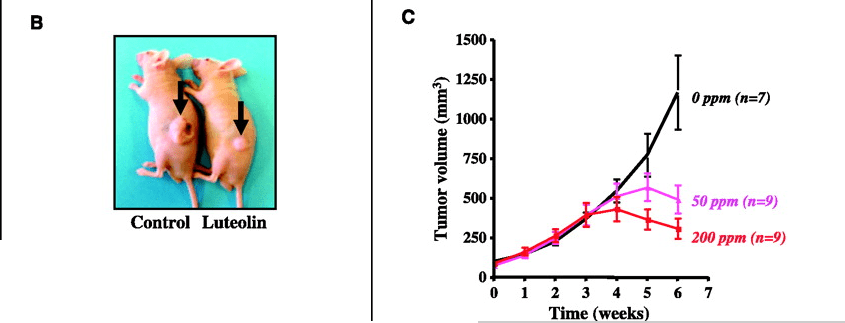
Although type II site ligands like luteolin do not bind to ERα or ERβ (21), they are anti-estrogenic in the rat uterus (1, 2, 7, 18). Only two genes (GTF2H2 and NCOA3) were affected by both estradiol and luteolin. Thus, the response of ESP genes to luteolin is specific and separate from genes regulated by estradiol in these cells.
(not estrogenic, but mauritio mentioned potential for lowering dopamine. and saw it has selective MAO-A inhibition so may be more serotonergic, if so at concentrations needed & if notice worse mood may need offsetting with something dopaminergic)
- a potent apoptosis-inducing effect of luteolin (50 μmol/L) is shown in three hepatoma cell lines
2nd is chlorophyll A in pancreatic cancer,
dose was low at 1.5mg/kg in mice, in a little ethanol mixed with oil (probably helped absorption)
https://www.ncbi.nlm.nih.gov/pmc/articles/PMC6051000/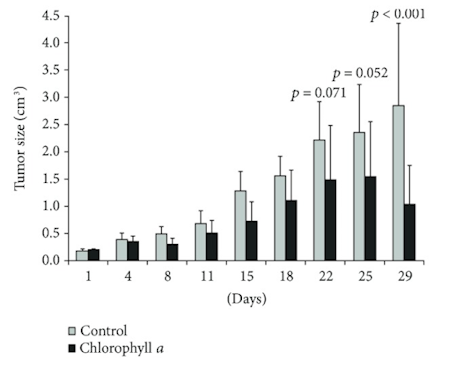
^ the tumor size plateaued at day 25, then reversed- Since chlorophylls significantly reduced the viability of pancreatic cancer cells, we tested the effect of chlorophyll a on tumor growth in an in vivo study on athymic mice xenotransplanted subcutaneously with PaTu-8902 human pancreatic cancer cells. A daily oral treatment of chlorophyll a led to a substantial decrease in tumor size in treated animals (Figure 8). It is of note that after a month of treatment, the pancreatic tumors were approximately one-third the size of those treated with placebo (1.04 ± 0.8 versus 2.86 ± 1.6 cm3, p < 0.001 (Figure 8)) indicating that even oral administration of the relatively poorly soluble chlorophyll a is a very efficient approach to prevent the progression of this malignant cancer.
The antioxidant effects are among the most firmly established activities exerted by chlorophylls. For instance, it has been documented that chlorophyllin confers a higher degree of protection against free radicals in comparison to other antioxidants such as ascorbic acid and glutathione [38]. In fact, we recently observed that the antioxidant effects of the tetrapyrroles, bilirubin, and phycocyanobilin dramatically differed from those of other antioxidants. The most prominent feature of their action was the attenuation of mitochondrial ROS production [39, 40]. Here, we have shown that the same is true for chlorophylls.
All chlorophylls tested not only consistently improved total peroxyl radical-scavenging activities but also suppressed the production of mitochondrial ROS and total cellular hydrogen peroxide by cancer cells, accompanied by a shift of the glutathione redox status towards a reduction.
Importantly, mitochondrial ROS govern the cellular redox signaling, and an increase in their production has been shown to be critical for tumorigenesis [41, 42]. However, cancer cells also upregulate antioxidant protection in order to maintain the balance between oxidative signaling and oxidative stress [43]. Indeed, several reports suggest that supplementation with antioxidants including N-acetylcysteine and tocopherol may, in fact, promote the progression of cancer through their protection against oxidative stress [44, 45].
However, here, we report that chlorophylls, in contrast to other antioxidants, suppressed the progression of pancreatic cancer. This effect was accompanied by attenuated expression and activity of HMOX1, a crucial component of the intrinsic cellular antioxidant system. This might really have relevance to their anticancer effects, since HMOX1 expression has been reported to prevent the responsiveness of pancreatic cancer to cytostatic therapy [17]. It is interesting to note that this effect might be (cancer) cell-specific, since the opposite activity against HMOX1 expression was observed for chlorophyllin-treated human umbilical vein endothelial cells [46]. Our observation may not seem surprising in light of the interrelationships between chlorophyll and HMOX in plants [47]. Also, BLVRA, another important enzyme in the heme catabolic pathway, has been proposed as promoting carcinogenesis [18]. In fact, the increased expression of BLVRA has been demonstrated in patients with hepatocellular cancer [19], as well as in breast and lung cancer cell lines [20]. Nevertheless, in our in vitro studies on human pancreatic cancer cells, we did not observe any effects of chlorophylls on BLVRA expression.
Interestingly, we did not observe any effect of chlorophylls on glutaminolysis or reductive carboxylation, indicating that neither glycolysis nor mitochondrial respiration was affected by chlorophyll treatment [25]. Hence, it seems that the antiproliferative effects of chlorophylls are related to the suppression of ROS production and are unrelated to cell bioenergetics.
lipoic acid also came close , for breast cancer
drastically slowed breast cancer in vivo at 18.5mg/kg ~100mg. and started plateauing by the end, but didnt get to reversal in timeframe tested for
https://www.tandfonline.com/doi/full/10.4161/cbt.22003
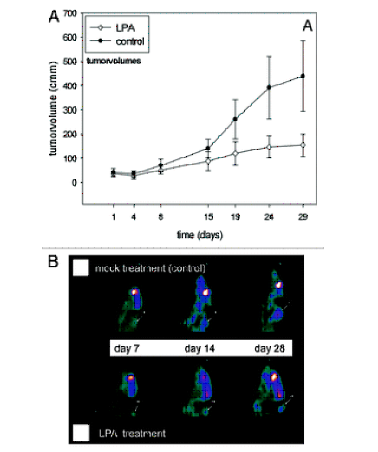
mechanism mentioned preventing glycolysis metabolism converting pyruvate to lactate , lipoic acid inhibits pyruvate dehydroginase kinase so prevents the inhibition of pyruvate dehydroginase , giving more pyruvate -> acetyl coa instead of lactate
(also restores glucose utilization in the brain , at 10mg/kg 50mg - 70mg , and increases bdnf and dna repair proteins) https://www.frontiersin.org/articles/10.3389/fnagi.2020.00262/full - At 4 weeks after the beginning of luteolin-containing food intake, the HAK-1B tumor volume began to decrease in a dosage-dependent manner. After 5 weeks of the dietary luteolin treatment, a significant decrease in tumor volume was found even in mice taking 50 ppm luteolin-containing food.
-
 C cs3000 referenced this topic on
C cs3000 referenced this topic on
-
@cs3000 carbon dioxide therapy co2 came close ,
20 minutes in a bag filled with co2 that covers half the body, amazingly just twice a week, enhanced by a gel applied locally
https://journals.plos.org/plosone/article?id=10.1371/journal.pone.0100530
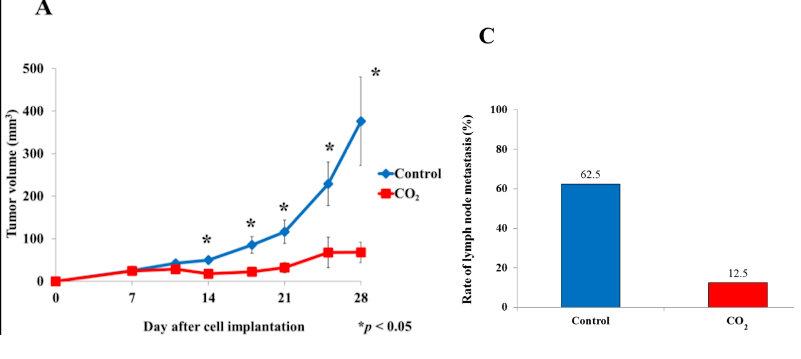
-
@cs3000 said in 2 studies showing cancer reversal / shrinking:
@cs3000 carbon dioxide therapy co2 came close ,
20 minutes in a bag filled with co2 that covers half the body, amazingly just twice a week, enhanced by a gel applied locally
https://journals.plos.org/plosone/article?id=10.1371/journal.pone.0100530

Wow that one is impressive !! RP right again.
So doing a CO2 bath a la Ray peat should be a very good cancer prevention even just once or twice a week!In this study they used a skin cancer , im wondering if other cancers would react the same way. In the abstract they say that it decreased lung metastasis in a previous study, I'd still like to see more studies with dofferenr tumors.
That treatment setup with mice is kind of hilarious

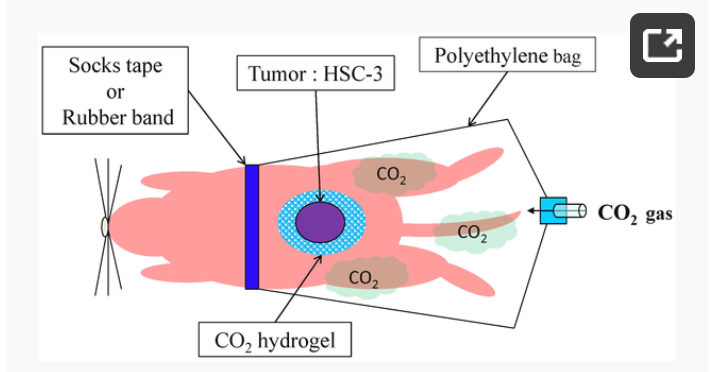
-
You should also check out the effects methionine restriction on cancer , especially as a combination with methioniase. There's some impressive case studies in humans as well.
-
@Mauritio
yep and i imagine daily would be even better, interesting that short duration was effectivei saw a pic someone posted in a co2 thread with a crazy tall straight clear bag strapped around his head going right up to the ceiling, and was taken from low angle as extra perspective, creased me up , imagine experience of a delivery guy walking in on this lol, "welcome, have you heard about ray peat" before he leaves.
& probably not the safest, but i respected the effort,
will have alook at that
it does work broadly yeah
here it had less profound effect in a connective tissue cancer but still good
https://www.ncbi.nlm.nih.gov/pmc/articles/PMC3499556/#s2title they did 10 minutes instead of 20 minutesI just saw something amazing actually
when they tested it on breast cancer in vivo it almost didnt grow at all
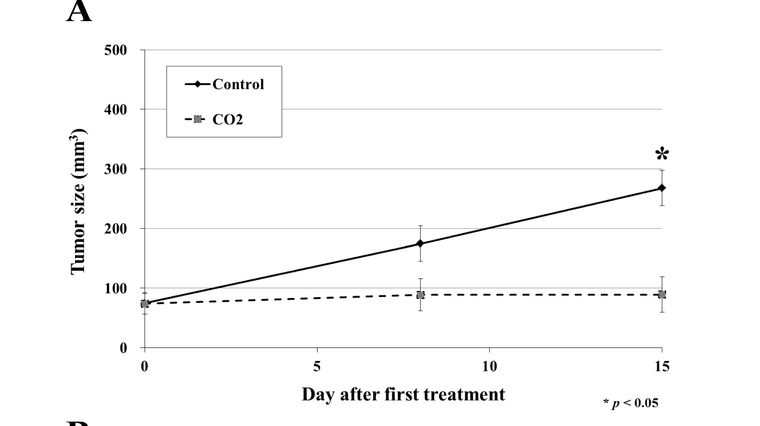
-
@cs3000 said in 2 studies showing cancer reversal / shrinking:
@Mauritio yep and i imagine daily would be even better, interesting that short duration was effective it does work broadly yeah
here it had less profound effect in a connective tissue cancer but still good
https://www.ncbi.nlm.nih.gov/pmc/articles/PMC3499556/#s2title they did 10 minutes instead of 20 minutes .
I just saw something amazing actually when they tested it on breast cancer in vivo it almost didnt grow at all :Here we go, big one
https://www.spandidos-publications.com/10.3892/or.2017.5591
great studies by these people exploring all the anglesSurprisingly going for more days of co2 weekly didnt give better effect, 2 days is enough,
but going for longer than 10 minutes does give more improvement (20 minutes worked better) in breast & bone cancer, effect peaks around there as 1 hr did not give better effect- Additionally, in a preliminary study, no further decrease in tumor volume was observed with the 1-h treatment compared to the 20-min treatment
- For the CO2 therapy, there was no difference in effectiveness of frequencies of twice and five times per week; in addition, a twice-weekly treatment regimen was sufficient to inhibit in vivo tumor growth, even in MFH/UPS, which is a high-grade sarcoma cell line.
And they found the cancer regressed below baseline with 20 minutes applications, in all of the mice
And they even said two of the breast cancer tumors disappeared @haidut
Bone tumors also got smaller below baseline
.... this is happening fast over a few days / weeks ... amazingit did not work as well on a rarer aggressive sarcoma tumor. but slowed growth with this (which the table doesnt show)
-
in addition, a twice-weekly treatment regimen was sufficient to inhibit in vivo tumor growth, even in MFH/UPS, which is a high-grade sarcoma cell line.
-
In the current study, the most significant antitumor effect was observed in the MDA-MB-231 breast cancer model. At the end of treatment, all treated tumors in the MDA-MB-231 model were smaller than pre-treated tumors, and notably, two of the six tumors in the 20-min group had disappeared
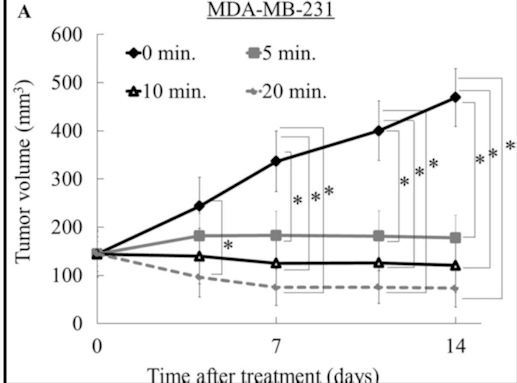

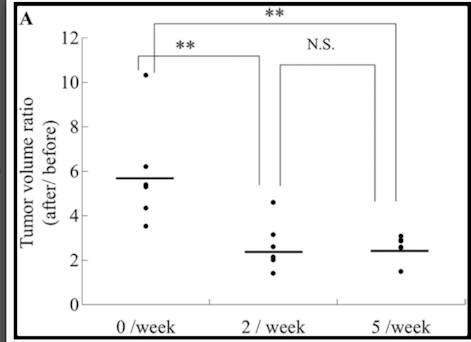
Additionally, using a treatment frequency of twice per week, tumor volumes were smaller with a treatment interval of 3 and 4 days than with a treatment interval of 2 and 5 days.
We also found that transcutaneous CO2 application was ineffective when applied at a distant site relative to the tumor location. Therefore, the CO2 therapy should be applied to the body surface close to the tumor location.
We previously developed an alternative system for CO2 application that can access deep-seated tumors using intra-arterial infusion of saturated CO2 solution (20). These findings suggest that continuous treatment, twice per week with an interval of 3 + 4 days, applied to the local site of the tumor, provides the best antitumor effect for transcutaneous CO2 application.So 20 minutes, enhanced by a co2 capturing gel locally to the tumor site, 2 times per week, every wednesday and sunday (3 & then 4 days), gives max effectiveness
sounds like simple glycerol/glycerin + water could work for the gel,
or sodium alginate
(majority water as long as its thick enough to not run down skin)
https://patents.google.com/patent/JPWO2004002393A1/en?oq=WO2004%2F002393-
A viscous liquid prepared using 2 parts by weight of sodium alginate as a thickener and 98 parts by weight of purified water as water is impregnated into a 4 cm diameter polyester nonwoven fabric, and this is immersed in a 1% calcium chloride aqueous solution to support the nonwoven fabric. A hydrogel film of calcium alginate as a body was prepared, and this was adopted as a carbon dioxide absorption aid 4
-
An appropriate amount of the carbon dioxide absorption assisting material 4 is applied to a 5 mm diameter scratch on the left back of a 37-year-old woman, a left hand is put in the sealed envelope 2, and carbon dioxide is supplied to the sealed envelope 2 by the carbon dioxide supply device 3 to 10 seconds at a rate of 200 milliliters / second, and then 5 minutes at a rate of 20 milliliters / second. When the auxiliary material was washed away, the pain felt before touching the water completely disappeared, and the wound healing promoting effect was confirmed.
-
A 48-year-old man's 5cm square carbon dioxide absorption aid 4 is affixed to the left back of the 48-year-old man, and without putting anything on the right back, each hand is put in the two sealed enclosures 2a and 2b, and each enclosed enclosure Carbon dioxide was first supplied to the material 2 from the carbon dioxide supply device 3 at a rate of 200 milliliters / second for 10 seconds and then at a rate of 20 milliliters / second for 7 minutes.
The man's hands quickly became warm, but the left back felt warmer than the right back.
Gel + ~ 7 Liters of co2 gas sealed in a 20cm long plastic bag was enough for pain reduction and wound healing effect in this woman
-
@cs3000 said in 2 studies showing cancer reversal / shrinking:
i saw a pic someone posted in a co2 thread with a crazy tall straight clear bag strapped around his head going right up to the ceiling, and was taken from low angle as extra perspective, creased me up , imagine experience of a delivery guy walking in on this lol, "welcome, have you heard about ray peat" before he leaves.
& probably not the safest, but i respected the effort,
will have alook at that Lol ... The word peatard exists for a reason
Lol ... The word peatard exists for a reason@cs3000 said in 2 studies showing cancer reversal / shrinking:
I just saw something amazing actually
when they tested it on breast cancer in vivo it almost didnt grow at allNice so it works for breast cancer as well.
-
@cs3000 said in 2 studies showing cancer reversal / shrinking:
@cs3000 said in 2 studies showing cancer reversal / shrinking:
@Mauritio yep and i imagine daily would be even better, interesting that short duration was effective it does work broadly yeah
here it had less profound effect in a connective tissue cancer but still good
https://www.ncbi.nlm.nih.gov/pmc/articles/PMC3499556/#s2title they did 10 minutes instead of 20 minutes .
I just saw something amazing actually when they tested it on breast cancer in vivo it almost didnt grow at all :Here we go, big one
https://www.spandidos-publications.com/10.3892/or.2017.5591
great studies by these people exploring all the anglesSurprisingly going for more days of co2 weekly didnt give better effect, 2 days is enough,
but going for longer than 10 minutes does give more improvement (20 minutes worked better) in breast & bone cancer, effect peaks around there as 1 hr did not give better effect- Additionally, in a preliminary study, no further decrease in tumor volume was observed with the 1-h treatment compared to the 20-min treatment
- For the CO2 therapy, there was no difference in effectiveness of frequencies of twice and five times per week; in addition, a twice-weekly treatment regimen was sufficient to inhibit in vivo tumor growth, even in MFH/UPS, which is a high-grade sarcoma cell line.
And they found the cancer regressed below baseline with 20 minutes applications, in all of the mice
And they even said two of the breast cancer tumors disappeared @haidut
Bone tumors also got smaller below baseline
.... this is happening fast over a few days / weeks ... amazingit did not work as well on a rarer aggressive sarcoma tumor. but slowed growth with this (which the table doesnt show)
-
in addition, a twice-weekly treatment regimen was sufficient to inhibit in vivo tumor growth, even in MFH/UPS, which is a high-grade sarcoma cell line.
-
In the current study, the most significant antitumor effect was observed in the MDA-MB-231 breast cancer model. At the end of treatment, all treated tumors in the MDA-MB-231 model were smaller than pre-treated tumors, and notably, two of the six tumors in the 20-min group had disappeared



Additionally, using a treatment frequency of twice per week, tumor volumes were smaller with a treatment interval of 3 and 4 days than with a treatment interval of 2 and 5 days.
We also found that transcutaneous CO2 application was ineffective when applied at a distant site relative to the tumor location. Therefore, the CO2 therapy should be applied to the body surface close to the tumor location.
We previously developed an alternative system for CO2 application that can access deep-seated tumors using intra-arterial infusion of saturated CO2 solution (20). These findings suggest that continuous treatment, twice per week with an interval of 3 + 4 days, applied to the local site of the tumor, provides the best antitumor effect for transcutaneous CO2 application.So 20 minutes, enhanced by a co2 capturing gel locally to the tumor site, 2 times per week, every wednesday and sunday (3 & then 4 days), gives max effectiveness
sounds like simple glycerol/glycerin + water could work for the gel,
or sodium alginate
(majority water as long as its thick enough to not run down skin)
https://patents.google.com/patent/JPWO2004002393A1/en?oq=WO2004%2F002393-
A viscous liquid prepared using 2 parts by weight of sodium alginate as a thickener and 98 parts by weight of purified water as water is impregnated into a 4 cm diameter polyester nonwoven fabric, and this is immersed in a 1% calcium chloride aqueous solution to support the nonwoven fabric. A hydrogel film of calcium alginate as a body was prepared, and this was adopted as a carbon dioxide absorption aid 4
-
An appropriate amount of the carbon dioxide absorption assisting material 4 is applied to a 5 mm diameter scratch on the left back of a 37-year-old woman, a left hand is put in the sealed envelope 2, and carbon dioxide is supplied to the sealed envelope 2 by the carbon dioxide supply device 3 to 10 seconds at a rate of 200 milliliters / second, and then 5 minutes at a rate of 20 milliliters / second. When the auxiliary material was washed away, the pain felt before touching the water completely disappeared, and the wound healing promoting effect was confirmed.
-
A 48-year-old man's 5cm square carbon dioxide absorption aid 4 is affixed to the left back of the 48-year-old man, and without putting anything on the right back, each hand is put in the two sealed enclosures 2a and 2b, and each enclosed enclosure Carbon dioxide was first supplied to the material 2 from the carbon dioxide supply device 3 at a rate of 200 milliliters / second for 10 seconds and then at a rate of 20 milliliters / second for 7 minutes.
The man's hands quickly became warm, but the left back felt warmer than the right back.
Gel + ~ 7 Liters of co2 gas sealed in a 20cm long plastic bag was enough for pain reduction and wound healing effect in this woman
Wow ,what a study!
So it does work for some but not all tumors. But it seems to at least help in all tumors for almost no cost and risk involved. Sounds great.
If the CO2 application is applied too distant from the tumor it doesn't work, though. So if you have a big bag for the CO2 bath, that only goes up until your navel and your tumor is in your thyroid, it won't work.
So for prevention purposes the bag should cover as much body surface area as possible, because you never know where a tumor is developing. Although I'm sure there's something like a beneficial bystander effect. Even if you only bath your foot in CO2 , the whole body will benefit.Peat said just having a wet body surface enhances absorption so after showering would be good time .
-
-
@mauritio
yep easy on the body
the one it showed inhibition on but not shrinkage was a highly aggressive type, i think haiduts study is on an aggressive type too showing a curative effect from the raising of co2 internally . but for people who get inflammatory / allergic reaction to aspirin or have gut issues, maybe external co2 combined with lipoic acid (pyruvate dehydrogenase increaser) + thiamine (carbonic anhydrase inhibitor) could tip things over for this aggressive type tooi didnt find how much co2 they used so going by the process the used in their patent for the wound healing effect assuming its the same.
they said ~7L 8L co2 gas in a bag around the arm 20cm x 15cm, so only a small amount needed with gel, i think 1L at standard temp / pressure is ~2g co2
@Mauritio said in 2 studies showing cancer reversal / shrinking:If the CO2 application is applied too distant from the tumor it doesn't work, though. So if you have a big bag for the CO2 bath, that only goes up until your navel and your tumor is in your thyroid, it won't work.
So for prevention purposes the bag should cover as much body surface area as possible, because you never know where a tumor is developing. Although I'm sure there's something like a beneficial bystander effect. Even if you only bath your foot in CO2 , the whole body will benefit.yeh, mainly local & i'd think the co2 would accumulate at the bottom of the bag if its not filled enough right. but if using a see-through bag can see if skin higher is changing color too or not
if need to target the torso or higher a full 150L bag might be ~ 300g co2 , i guess someone would know if thats too high systemically by body reaction ,
Someone mentioned having carbs 30 minutes before starting , good idea
@Amazoniac With gel it traps the co2 then moves through the skin when it reaches max capacity, and keeps the skin moist through the 20 minute session enhancing absorption , as gel form doesn't evaporate off the skin quick
@TexugoDoMel posted a study showing even using an acid + baking soda in gel has positive effects on muscle repair without using co2 gasBecause of its relatively high solubility, CO2 gas dissolves in the hydrogel. The dissolved CO2 then permeates the skin, moving down its concentration gradient when the maximum solubility in the hydrogel is reached. Our previous study showed that CO2 penetrated human tissue by this system
In this system, the CO2 hydrogel is applied to the skin to allow CO2 to dissolve and penetrate into the local tissue, which humidifies the skin without bathing, thereby forming a passage for CO2 to reach the local tissues. This system allows for the easy application of CO2 to any site of the body.
(without water or gel vs gel)
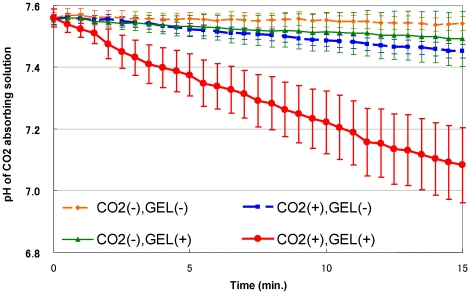
-
Tissues are permeable to CO2, but unlike internal tissues, it seems that the packed organization of the skin inhibits the diffusion of CO2.
I had in mind that a CO2-saturated gel would be superior to CO2 in air, but inferior to direct contact with 100% CO2 gas, making the gel work more as a barrier. However, it can be pressed against the skin to move other components out and maximize absorption.
The pH of the solution decreasing shows that CO2 was yielding some carbonic acid, which further complicates absorption when it ionizes (CO2 + H2O → H2CO3 → H+ + HCO3–), although the skin pH is about 5.
Another advantage of direct gas exposure would be quick renewal. With the gel, the redistribution of CO2 towards the contact sites can be slower.
What am I missing?
-
Methionine restriction to enhance Rapamycin (& high dose thiamine possibly as a CA inhibitor but less so)
https://bioenergetic.forum/post/26937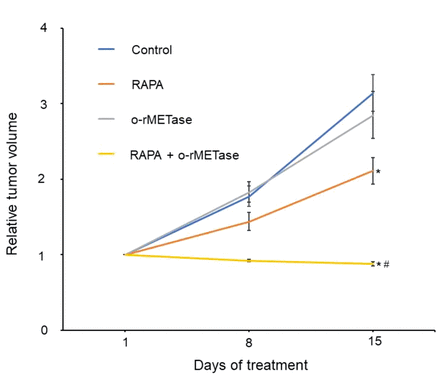
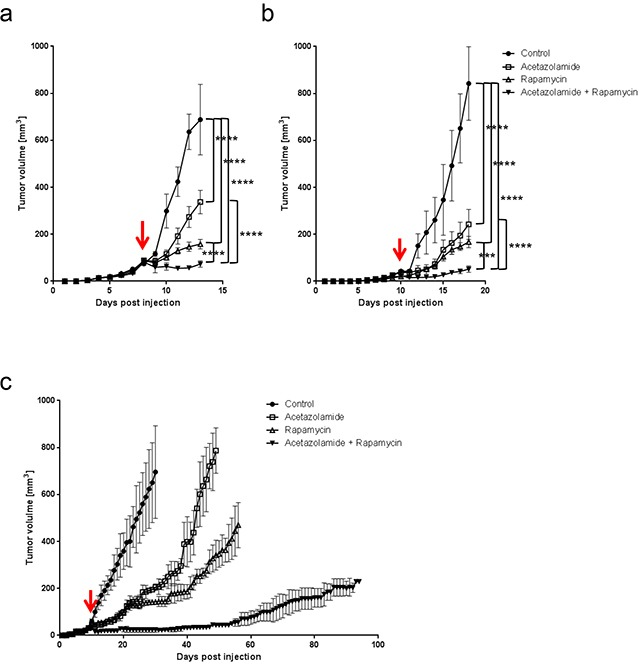
-
@cs3000 said in 2 studies showing cancer reversal / shrinking:
@cs3000 said in 2 studies showing cancer reversal / shrinking:
@Mauritio yep and i imagine daily would be even better, interesting that short duration was effective it does work broadly yeah
here it had less profound effect in a connective tissue cancer but still good
https://www.ncbi.nlm.nih.gov/pmc/articles/PMC3499556/#s2title they did 10 minutes instead of 20 minutes .
I just saw something amazing actually when they tested it on breast cancer in vivo it almost didnt grow at all :Here we go, big one
https://www.spandidos-publications.com/10.3892/or.2017.5591
great studies by these people exploring all the anglesSurprisingly going for more days of co2 weekly didnt give better effect, 2 days is enough,
but going for longer than 10 minutes does give more improvement (20 minutes worked better) in breast & bone cancer, effect peaks around there as 1 hr did not give better effect- Additionally, in a preliminary study, no further decrease in tumor volume was observed with the 1-h treatment compared to the 20-min treatment
- For the CO2 therapy, there was no difference in effectiveness of frequencies of twice and five times per week; in addition, a twice-weekly treatment regimen was sufficient to inhibit in vivo tumor growth, even in MFH/UPS, which is a high-grade sarcoma cell line.
And they found the cancer regressed below baseline with 20 minutes applications, in all of the mice
And they even said two of the breast cancer tumors disappeared @haidut
Bone tumors also got smaller below baseline
.... this is happening fast over a few days / weeks ... amazingit did not work as well on a rarer aggressive sarcoma tumor. but slowed growth with this (which the table doesnt show)
-
in addition, a twice-weekly treatment regimen was sufficient to inhibit in vivo tumor growth, even in MFH/UPS, which is a high-grade sarcoma cell line.
-
In the current study, the most significant antitumor effect was observed in the MDA-MB-231 breast cancer model. At the end of treatment, all treated tumors in the MDA-MB-231 model were smaller than pre-treated tumors, and notably, two of the six tumors in the 20-min group had disappeared



Additionally, using a treatment frequency of twice per week, tumor volumes were smaller with a treatment interval of 3 and 4 days than with a treatment interval of 2 and 5 days.
We also found that transcutaneous CO2 application was ineffective when applied at a distant site relative to the tumor location. Therefore, the CO2 therapy should be applied to the body surface close to the tumor location.
We previously developed an alternative system for CO2 application that can access deep-seated tumors using intra-arterial infusion of saturated CO2 solution (20). These findings suggest that continuous treatment, twice per week with an interval of 3 + 4 days, applied to the local site of the tumor, provides the best antitumor effect for transcutaneous CO2 application.So 20 minutes, enhanced by a co2 capturing gel locally to the tumor site, 2 times per week, every wednesday and sunday (3 & then 4 days), gives max effectiveness
sounds like simple glycerol/glycerin + water could work for the gel,
or sodium alginate
(majority water as long as its thick enough to not run down skin)
https://patents.google.com/patent/JPWO2004002393A1/en?oq=WO2004%2F002393-
A viscous liquid prepared using 2 parts by weight of sodium alginate as a thickener and 98 parts by weight of purified water as water is impregnated into a 4 cm diameter polyester nonwoven fabric, and this is immersed in a 1% calcium chloride aqueous solution to support the nonwoven fabric. A hydrogel film of calcium alginate as a body was prepared, and this was adopted as a carbon dioxide absorption aid 4
-
An appropriate amount of the carbon dioxide absorption assisting material 4 is applied to a 5 mm diameter scratch on the left back of a 37-year-old woman, a left hand is put in the sealed envelope 2, and carbon dioxide is supplied to the sealed envelope 2 by the carbon dioxide supply device 3 to 10 seconds at a rate of 200 milliliters / second, and then 5 minutes at a rate of 20 milliliters / second. When the auxiliary material was washed away, the pain felt before touching the water completely disappeared, and the wound healing promoting effect was confirmed.
-
A 48-year-old man's 5cm square carbon dioxide absorption aid 4 is affixed to the left back of the 48-year-old man, and without putting anything on the right back, each hand is put in the two sealed enclosures 2a and 2b, and each enclosed enclosure Carbon dioxide was first supplied to the material 2 from the carbon dioxide supply device 3 at a rate of 200 milliliters / second for 10 seconds and then at a rate of 20 milliliters / second for 7 minutes.
The man's hands quickly became warm, but the left back felt warmer than the right back.
Gel + ~ 7 Liters of co2 gas sealed in a 20cm long plastic bag was enough for pain reduction and wound healing effect in this woman
I am going through the studies that this Takeshi guy did and there's some interesting ones. Not sure if that one has been shared.
CO2 therapy was just as effective as radiation therapy for this oral squamous cell carcinoma.
But CO2 and radiation combined was a lot more effective. And I suppose CO2 made the radiation a lot safer, as can be seen by the rescued white blood cell count.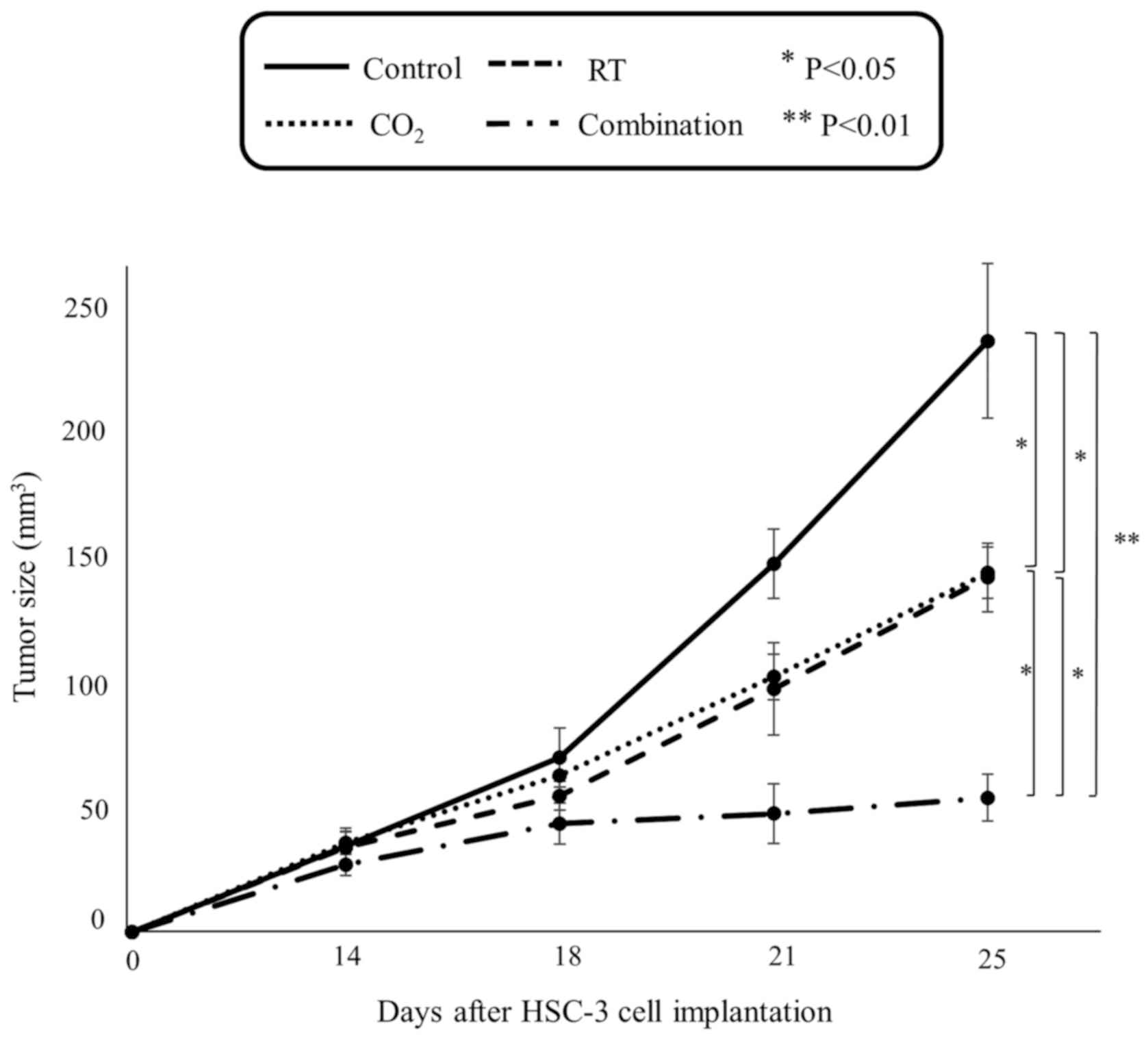
-
@cs3000 Another good one easily accessible,
Simply heating up the body / raising core temp while giving some glucose before stopped breast cancer tumors from growing & even shrank them
https://www.jstage.jst.go.jp/article/thermalmedicine1985/16/4/16_4_229/_pdf/-char/en
Notably, the combined treatment with glucose and WBH suppressed the tumour growth almost completely for 7 days
Cool study, the glucose feeding with the body heating gave an improved effect and even shrank the tumor , (around 40 grams human equivalent glucose)
Just 1 use kept it from growing over a week and shrank it for 5 days, so doing it multiple times a week with a few days between might keep the shrinking effect going continually
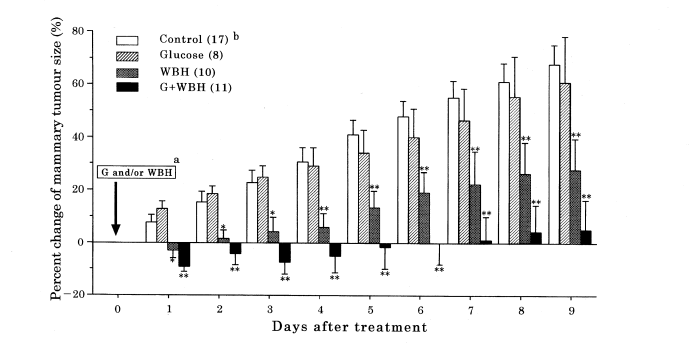
Mammary tumour growth was strongly inhibited in both group WBH and group G+WBH though the degree of the inhibition was much more marked in group G+WBH, in which the growth was inhibited completely until 7 days after WBH compared to 2 days at most in group WBH.
they raised core temp to 39 - 41 degrees over 3 hours, but maintaining 40 degrees+ is where things can get dangerous with cell damage / death. 39 degrees - 39.5 degrees should be manageable and can hit using saunas / portable saunas / baths. (as doing this for hours with metabolism being stimulated i would top up some carb intake every 30 mins)
haidut mentioned in his study about changing cellular pH as a key, authors also mentioned:
This reflects the stimulation of general metabolism and decrease of pH of tumour tissue, which contributes to the tumour growth inhibition
-
the whole "vegetables are le bad" is cringe tbqhwu fam
-
@cs3000 said in 2 studies showing cancer reversal / shrinking:
This reflects the stimulation of general metabolism and decrease of pH of tumour tissue, which contributes to the tumour growth inhibition
https://link.springer.com/chapter/10.1007/978-4-431-67035-3_48
After inducing hyperglycemia by glucose administration, nonheated tumor tissue pH decreased by 0.3 to 0.6, whereas pH of nonheated normal tissue fell by only 0.1 to 0.2, with a slower recovery to the previous level than the tumor tissue. On heating after glucose administration, tumor tissue pH fell from 6.9 to 6.5 immediately after heating with a delay of recovery time after heating. In normal tissue, tissue pH of 7.2 before heating fell to 6.9, rapidly recovering to a level higher than the baseline after the heat treatment. Hyperglycemia caused by glcose administration induced a selective decrease of tumor tissue pH, indicating the possibility of inducing selective heat sensitivity in tumors.
and more on selective action on tumors https://www.jstage.jst.go.jp/article/thermalmedicine1985/17/4/17_4_203/_pdf
Differrent effects on different tumors https://www.researchgate.net/publication/15612753_Apoptosis_in_tumors_and_normal_tissues_induced_by_whole_body_hyperthermia_in_rats
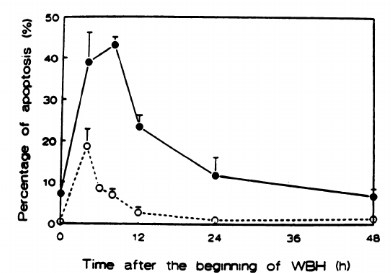
no effect on very aggressive type unless paired with something https://www.tandfonline.com/doi/pdf/10.3109/02656739709023548?needAccess=true&role=button(those are without carbs boosting, so not getting full effect)
22 degrees ambient temp (blue) vs 30 degrees (red) = big difference in tumor growth.
but boosting core temp 1x a week 6 hours to an average of 39 degrees+ didnt have much effect (why a drastically less significant outcome to the other study? it isnt boosted with carbs before but im assuming they ate carbs during those 6 hours. and the other study also showed a decent inhibitory effect without carbs too. is 40 degrees being at the edge of harmful necessary e.g where atp starts to drop in heart ? is 6 hours too long vs 2-3 hours? maybe in the one with more profound effect most of them hit 39.5+ instead of 39? )
Or maybe once a week there wasnt enough to offset the negative effects of the cold temp being 22 degrees instead of preferred thermoneutral 26+ degrees in mice? did the other study use higher housing temp baseline?no, other one used 22-23 ambient temp too
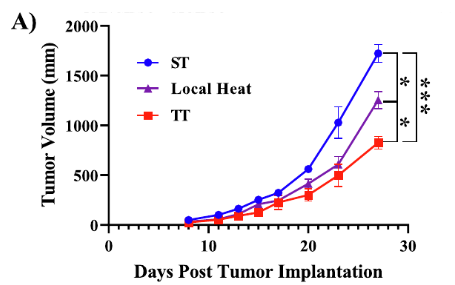
-
insight on what might be good timing for heat therapy
https://pubmed.ncbi.nlm.nih.gov/14023863/ (i've seen in other areas e.g decreasing repetitive behaviours, effects from 1 session can last into 24hrs - 48 hrs later)When you heat cells they gain a temporary heat tolerance when recovering
I guess the main mechanisms with this are 1. heating cancer cells that have poor ability to dissipate heat so more easily damaged + 2. lowering pH to help induce apoptosis (lower pH so capsase can activate properly and self destruct the cell https://www.nature.com/articles/4400779 which happens optimally at 6.4 pH, and in a study i posted it showed glucose + heat took the tumor from 6.9 -> 6.5 and induced a slower rate of pH recovery) probably by increasing co2 with the carbs & stimulating metabolism. so for the first part
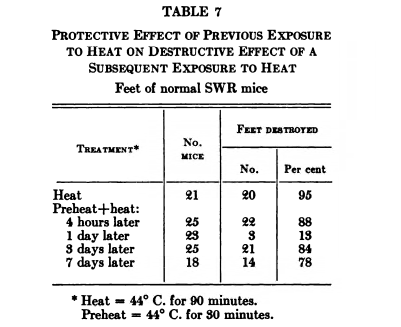
Resistant effect mostly lasts 2-3 days
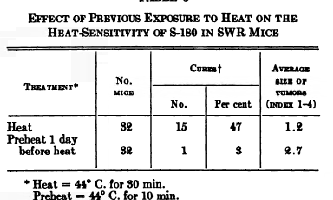
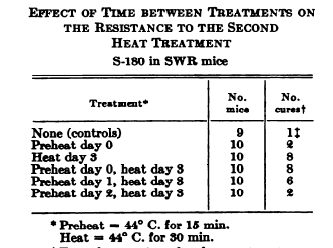
day to day loses its effect
mostly back to normal with 1 day break but not fully,
the heat effect itself is not the only mechanism but going by that,would be 1st day carb+heat session then waiting 2 days after , every 4th day
-
@Mauritio said in Studies showing cancer reversal / shrinking:
@cs3000 said in 2 studies showing cancer reversal / shrinking:
@cs3000 said in 2 studies showing cancer reversal / shrinking:
@Mauritio yep and i imagine daily would be even better, interesting that short duration was effective it does work broadly yeah
here it had less profound effect in a connective tissue cancer but still good
https://www.ncbi.nlm.nih.gov/pmc/articles/PMC3499556/#s2title they did 10 minutes instead of 20 minutes .
I just saw something amazing actually when they tested it on breast cancer in vivo it almost didnt grow at all :Here we go, big one
https://www.spandidos-publications.com/10.3892/or.2017.5591
great studies by these people exploring all the anglesSurprisingly going for more days of co2 weekly didnt give better effect, 2 days is enough,
but going for longer than 10 minutes does give more improvement (20 minutes worked better) in breast & bone cancer, effect peaks around there as 1 hr did not give better effect- Additionally, in a preliminary study, no further decrease in tumor volume was observed with the 1-h treatment compared to the 20-min treatment
- For the CO2 therapy, there was no difference in effectiveness of frequencies of twice and five times per week; in addition, a twice-weekly treatment regimen was sufficient to inhibit in vivo tumor growth, even in MFH/UPS, which is a high-grade sarcoma cell line.
And they found the cancer regressed below baseline with 20 minutes applications, in all of the mice
And they even said two of the breast cancer tumors disappeared @haidut
Bone tumors also got smaller below baseline
.... this is happening fast over a few days / weeks ... amazingit did not work as well on a rarer aggressive sarcoma tumor. but slowed growth with this (which the table doesnt show)
-
in addition, a twice-weekly treatment regimen was sufficient to inhibit in vivo tumor growth, even in MFH/UPS, which is a high-grade sarcoma cell line.
-
In the current study, the most significant antitumor effect was observed in the MDA-MB-231 breast cancer model. At the end of treatment, all treated tumors in the MDA-MB-231 model were smaller than pre-treated tumors, and notably, two of the six tumors in the 20-min group had disappeared



Additionally, using a treatment frequency of twice per week, tumor volumes were smaller with a treatment interval of 3 and 4 days than with a treatment interval of 2 and 5 days.
We also found that transcutaneous CO2 application was ineffective when applied at a distant site relative to the tumor location. Therefore, the CO2 therapy should be applied to the body surface close to the tumor location.
We previously developed an alternative system for CO2 application that can access deep-seated tumors using intra-arterial infusion of saturated CO2 solution (20). These findings suggest that continuous treatment, twice per week with an interval of 3 + 4 days, applied to the local site of the tumor, provides the best antitumor effect for transcutaneous CO2 application.So 20 minutes, enhanced by a co2 capturing gel locally to the tumor site, 2 times per week, every wednesday and sunday (3 & then 4 days), gives max effectiveness
sounds like simple glycerol/glycerin + water could work for the gel,
or sodium alginate
(majority water as long as its thick enough to not run down skin)
https://patents.google.com/patent/JPWO2004002393A1/en?oq=WO2004%2F002393-
A viscous liquid prepared using 2 parts by weight of sodium alginate as a thickener and 98 parts by weight of purified water as water is impregnated into a 4 cm diameter polyester nonwoven fabric, and this is immersed in a 1% calcium chloride aqueous solution to support the nonwoven fabric. A hydrogel film of calcium alginate as a body was prepared, and this was adopted as a carbon dioxide absorption aid 4
-
An appropriate amount of the carbon dioxide absorption assisting material 4 is applied to a 5 mm diameter scratch on the left back of a 37-year-old woman, a left hand is put in the sealed envelope 2, and carbon dioxide is supplied to the sealed envelope 2 by the carbon dioxide supply device 3 to 10 seconds at a rate of 200 milliliters / second, and then 5 minutes at a rate of 20 milliliters / second. When the auxiliary material was washed away, the pain felt before touching the water completely disappeared, and the wound healing promoting effect was confirmed.
-
A 48-year-old man's 5cm square carbon dioxide absorption aid 4 is affixed to the left back of the 48-year-old man, and without putting anything on the right back, each hand is put in the two sealed enclosures 2a and 2b, and each enclosed enclosure Carbon dioxide was first supplied to the material 2 from the carbon dioxide supply device 3 at a rate of 200 milliliters / second for 10 seconds and then at a rate of 20 milliliters / second for 7 minutes.
The man's hands quickly became warm, but the left back felt warmer than the right back.
Gel + ~ 7 Liters of co2 gas sealed in a 20cm long plastic bag was enough for pain reduction and wound healing effect in this woman
I am going through the studies that this Takeshi guy did and there's some interesting ones. Not sure if that one has been shared.
CO2 therapy was just as effective as radiation therapy for this oral squamous cell carcinoma.
But CO2 and radiation combined was a lot more effective. And I suppose CO2 made the radiation a lot safer, as can be seen by the rescued white blood cell count.
Very interesting! RP right again.
So tumor prevention/treatment can be as simple as taking a hot bath and a CO2 bath once or twice a week.
I'm wondering where do heat shock proteins come into play here? They must be raised significantly...
I couldn't find peats newsletter on HSPs but here's the one on body temperature:
https://wiki.chadnet.org/body-temperature-inflammation-and-aging.pdf -
@Mauritio said in Studies showing cancer reversal / shrinking:
I'm wondering where do heat shock proteins come into play here? They must be raised significantly...
I couldn't find peats newsletter on HSPs but here's the one on body temperature:
https://wiki.chadnet.org/body-temperature-inflammation-and-aging.pdfHere is a video that might be of interest.
#51: Heat Shock Proteins | Antibiotic Resistance | DHT Safety | Energy and Aging with Ray Peat, PhDIt has timestamps that do not automatically hotlink on this forum.
00:00 - Start
01:10 - Ray's new newsletter
05:05 - Le Chatelier's principle, Lamarckian fish, Barbara McClintock
09:18 - Gilbert Ling, ATP "the queen of cardinal adsorbents," phase transitions, coacervates, rigor mortis
13:51 - "The role of ATP is not limited to the contraction cycle. It dominates the physical state of muscle even in rest, keeping it soft and pliable... rigor mortis is but a lack of ATP..." Albert Szent-Györgyi
14:43 - Does the activation of the heat shock proteins (HSPs) precede cell division?
16:02 - Niacinamide and solubility, energy loss, DNA repair
19:09 - What about gelatin?
20:85 - Estrogen activates HSPs, redox balance, progesterone inhibits HSPs, water economy
23:15 - Should we activate the HSPs?
25:12 - Will the activation of the HSPs leave a scar?
27:06 - "Energy deprivation stabilizing proteins"
29:37 - Metallic taste in the mouth, lipid peroxidation
30:20 - "Estrogen, hyperventilation, lactate, etc., increase serotonin, and I think it’s serotonin that directly increases PTH, and then PTH increases NO." Ray Peat (2017)
33:30 - The living cell is more susceptible in the fatigued state
38:23 - HSP inhibitors: tetracycline, progesterone, methylene blue, etc.
38:58 - Is PTH a "newer" part of the system?
40:25 - Is RAAS more ancient than the HPA?
40:54 - Ray Peat's newsletter, Progest-E from Kenogen, Ray's history with progesterone
45:24 - Why can progesterone fill-in for the adrenals but pregnenolone cannot?
48:14 - Are pregnenolone and progesterone "true" hormones?
49:25 - If someone has a sensitive stomach -- how can they take progest-E?
50:14 - Ray's thoughts on using DHT and testosterone, gynecomastia, finasteride, governing principles of health
55:40 - Is DHT always "safer" than testosterone? Ray's thoughts on TRT
58:34 - What does Ray think of as a "max dose" of aspirin at one time?
01:00:04 - What happens to the agaratine in mushrooms? Does the mushroom water contain agaratine?
01:01:26 - How to distinguish between a fungal and bacterial infection?
01:07:40 - Does Ray prefer pure olive oil over coconut oil for the carrot salad and mushrooms? 1/2 a teaspoon provides a trace of PUFA
01:08:39 - Are fungal infections rarer than bacterial infections?
01:09:20 - H.pylori infection -- how to treat? Thoughts on dosing antibiotics
01:12:41 - The two-week time frame for antibiotic use scientific?
01:13:45 - Is antibiotic resistance important for the individual?
01:14:28 - Does antibiotic use cause a fungal overgrowth?
01:16:05 - Tetracyclines as antifungals? Inflammation predisposes to infection, feeling "uncomfortable" on minocycline
01:19:16 - Danny's experience on minocycline
01:21:46 - Question: why would a virus want to invade a cell?
01:29:28 - Viruses and weakened organisms
01:30:57 - Do viral pandemics exist?
01:36:02 - “...That is, if one pursues any ‘physical’ illness far enough and deep enough, one will find inevitably intrapsychic, intrapersonal, and social variables that are also involved as determinants.” Maslow (1993)
01:38:08 - What's the factor in the environment that's leading to frailty in young people?
01:40:42 - If a group has a problematic "death culture" holy book -- how can a functioning society be maintained?
01:44:54 - Could a holistic view of science be a foundation for a functional society?
01:45:51 - What is the long-term "artificial" struggle between humans?
01:47:10 - Does authoritarianism have anything to do with nature?
01:49:52 - Did the USA peak in the 1950s? The CIA's profound influence on culture
01:54:10 - Is technology a net-negative for sustaining a free culture?
01:55:25 - What about hierarchy in nature? Is it natural to rule over others?
01:57:52 - If an animal's needs were met, would they not express aggression? "Survival of the fittest," Pyotr Kropotkin
02:01:31 - What would be necessary factors to sustain cooperation among individuals?
02:02:44 - What is the most important news event that Ray is thinking about at the moment?
2:03:28 - The road to serfdom, dollar inflation, stock market manipulation
2:05:51 - Has anything become clearer about what will happen when a large portion of the US becomes jobless?
2:06:32 - Polarization in society (left vs. right, man vs. woman, etc.)
2:09:55 - What was the connection between Karl Marx and the Rothschilds?
2:12:07 - Was the 1917 soviet revolution controlled by Zionists? -
I foud Rays newsletter mentioning HSPs. It's called:
"Cumulative damage,
degeneration, & aging possibilities of reversal"Here's a few relevant quotes:
"...it occurred to me that it
would be good to consider what happens when the body temperature is increased by external heat, beyond the level at which the organism functions optimally. ""Partly, I’m thinking about the damage
that can be done by the increasing popularity of sauna treatments, and various kinds of “hyperthermic therapy for cancer,”"Independently, estrogen and nitric oxide are
known to promote fibrosis and cancer, and now the basic role of HSP in fibrosis (Bonniaud, et al.,2017) and cancer is being recognized, and the drug companies are creating a variety of HSP inhibitors."This quote I included because it's almost poetic and beautiful.
"...time is very relevant to the
organism—its present structure and properties reflect its previous states, and project its future tendencies and possibilities, its trajectory in life."Now this is the most relevant point, which the studies you posted corroborated so beautifully:
"At bedtime, a mild warm bath can compensate for low internal heat production, increasing the metabolic rate and helping to increase glycogen stores and increase progesterone level, making
deep restorative sleep possible. But if the bath is too warm or too prolonged, or if estrogen’s influence is too great, the increased metabolic rate can
Intensify the inefficient metabolism further depleting energy stores, and leading to higher stress hormones. Having extra carbohydrate before and during the warm bath improves its therapeutic function, and decreases the risk of heat shock."